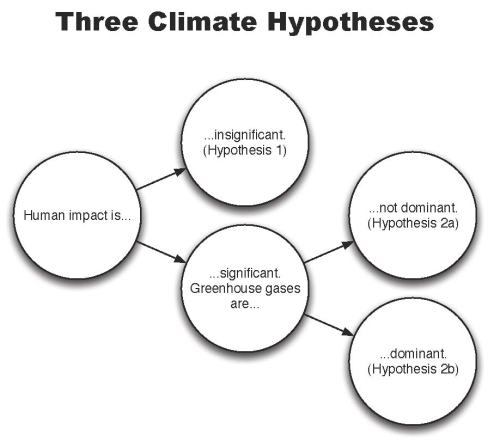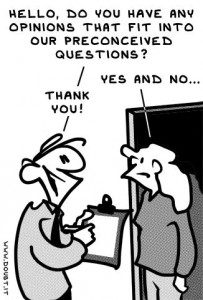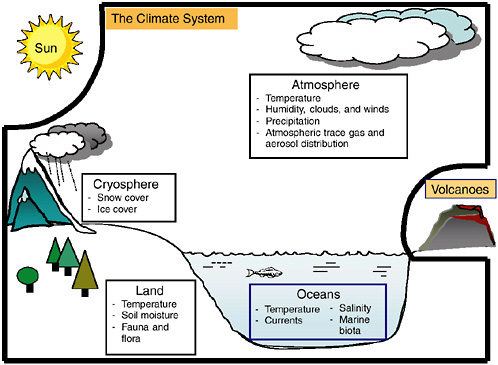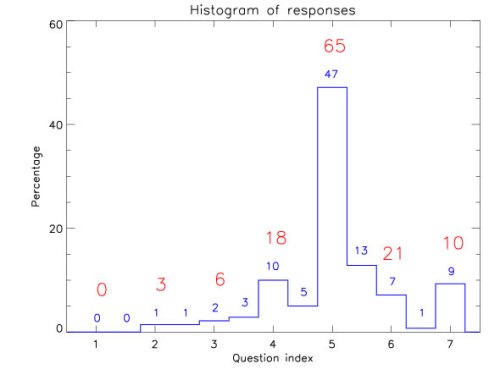UPDATE: July 14 2010: I have received a late feedback and have added to the end of this post.
On June 30 2010, I posted
Invitation On Assessing Three Climate Hypotheses
I have received excellent, insightful feedback and post them below. I will follow up in a subsequent post with my response.
COMMENT [Graduate Student who requested anonymity]
Dear Professor Pielke,
Although I am but a humble engineering student, I would like to offer my thoughts on the question of these hypotheses. I only hope it is okay with you if I do not use my full name-I don’t wish to hind behind anonymity in a hostile way, though. I just don’t want too much attention.
It seems to me that the three hypotheses are perfectly well stated as a broad way of talking about different views of climate. I also suspect that very few scientists hold either hypothesis 1 or 2b as being true, although this is just my impression. Where I suspect a problem occurs is that the hypotheses as stated may encompass very different quantitative views although they are essentially qualitatively distinct. For example, one may hold the view that ” human influences are significant” but still think that most of, for example, twentieth century trends were mostly natural, or even 50-50. “Significant” may just be taken to mean “measurable outside of the range of error” in which case one may view human effects as significant, but marginally so, or almost completely dominant, and still adhere to hypothesis 2a, even though these two positions are quite different. Similarly, I suppose one could argue that, while other human forcings play a role, GHG’s are the largest and therefore most important ones-the others matter, but less so. But as long as that person believed that those effects were small enough to escape reliable detection, they would support 2b. At some threshold, they’d suddenly be supporting 2a, if they believe the other human effects are measurable, but only barely.
So I suppose the only criticism of the hypotheses that I would make is that they could benefit from being seen as categories of more specific hypotheses, and more specific views, rather than the hypotheses about climate. Other than that, I think that they are well posed.
COMMENT Mike Owens
Roger
I read your weblog frequently and although I do not agree with all you say (but most of it to be true), your logic is consistent and to be admired, as is your persistence and determination to resist the excesses and exaggeration of alarmism.
I am a semi retired scientist living in the UK, originally an industrial chemist converted to chemical engineering and subsequently to studies in technical safety, including computational fluid dynamics for modelling of fires and explosions and general risk analysis mostly for offshore oil and gas facilities.
I feel that your original 2a implies that the natural forces are inferior to human influences. A more neutral 2a might be:-
Hypothesis 2a: The natural causes of climate variations and changes are undoubtedly important, but the human influences are also significant and involve a diverse range of first order climate forcings, including, but not limited to, the human input of carbon dioxide (CO2). Most, if not all, of these human influences on regional and global climate will continue to be of concern during the coming decades
If we are to retain 2a in its present wording, the proposed 2c below implies the opposite but, unlike hypothesis 1 still accepts that human influences are important:-
Hypothesis 2c: The natural causes of climate variations and changes are undoubtedly the most significant, but the human influences are also of some significance and involve a diverse range of significant climate forcings, including, but not limited to, the human input of carbon dioxide (CO2). Most, if not all, of these human influences on regional and global climate will continue to be of concern during the coming decades.
An alternative to 2c could be 1b i.e.:-
Hypothesis 1b: Human influence on climate variability and change is of some importance, but natural causes dominate climate variations and changes on all time scales. In coming decades, the human influence will continue to be less than that from natural causes, but still of some concern.
COMMENT [Bob Graza]
Roger,
Appreciate your web site. I have been visiting your site for a
couple of years on a regular basis and find the presentation of
material valuable and instructive.
As far as the 3 hypotheses, they seem to capture well the general positions held by those embroiled in the controversy.
It appears Gavin is being a bit evasive. He states, “…CO2
emissions…are the dominant issue moving forward.”
Hypothesis 2b states, “….human influences are significant & are dominated by….greenhouse gases, the most important of which is CO2.”
Though he acknowledges the significance of other climate forcing mechanisms, so does hypothesis 2b. Sounds like his position fits quite nicely into hypothesis 2b.
COMMENT [Michael Lenaghan]
I’ve attached a revised schematic which (I think) ties it a little
more closely to your original statements. (I don’t really care about attribution one way or the other.)
I think it would help to define what “significant” and “dominant” mean.

COMMENT [ Graham Long]
Dear Professor Pielke
The comments below are rather lengthy - this is because I think there are some tricky issues raised. If the comments are of any use, feel free to chop them down for inclusion.
I have no expertise in climate science at all – I teach political theory. Though it might be hard to believe given the length, these comments are very rough and ready, and many caveats apply…
Hypotheses 2a and 2b
I can see what you’re driving at here, but I did think there’s scope for dispute on the part of realclimate, in respect of both important parts of 2a and 2b: I too wasn’t clear, at first sight, whether these were mutually exclusive.
(1) Human influences: 2a says `involve a diverse range of first order climate forcing’ 2b says `dominated by the emissions into the atmosphere of greenhouse gases’. One natural reading is that an event can `involve a diverse range’ of contributing causes but causation can still be `dominated’ by one of them.
(2) Influences continuing to be of concern: 2a says `most will continue to be of concern’, 2b says that the adverse impact of greenhouse gases will be `the primary climate issue’. Again, it seems possible for one issue to be primary, but a variety of issues to still be of concern.
You might dispute whether influences really can be said to involve a diverse range but simultaneously be dominated by one, and whether a range of influences can be of concern, but one be truly primary. Does this hinge, I wonder, on an account of “forcing” or “influence”? On your reading, is it the case that one influence being dominant precludes there being a range of influences (since if one influence did by far the most of the work, the others could not by definition be influences)? I think realclimate are maintaining that there is nothing contradictory in holding one amongst these many is dominant, while still recognising the many.
The second, more “action-guiding” parts of 2a and 2b both seem to follow from the first, `descriptive’ parts ? I skimmed the article, and in this context, the final part of both hypotheses did seem to imply different views of the policy required. I took what you’re saying in the article to be that actually many people are wedded to an untenable hybrid of (a) and (b). The climate science supports a range of significant forcings (early 2a), but disproportionate policy attention is being directed at GHG ( later 2b)?
But they also don’t seem to be directly comparable in some respects. In 2a, I wondered if the qualification `most, if not all’ and the expression `continue to be of concern’ was making a point about these human influences not going away any time soon. I wondered if this wasn’t really the concern of the end of 2b, which sounds much more concerned with what should be the focus of policy attention. Relatedly, is “issue” or “concern” a question of policy action, or further research, or “keeping an eye on”?
My suggestion would be that the two hypotheses (a) be made more clearly mutually exclusive as a way of (partly – see below) circumventing the first, messy, issue, and (b) that the ideas in the final section of 2a be separated out a little. As a first stab, which hopefully serves to highlight some of these issues:
Hypothesis 2a: Although the natural causes of climate variations and changes are undoubtedly important, the human influences involve a diverse range of significant first order climate forcings, including but not limited to, the human input of carbon dioxide (C02). Most, if not all, of these human influences on regional and global climate will continue during the coming decades. These continuing influences should, together, be the focus of climate policy and research.
Hypothesis 2b: Although the natural causes of climate variations and changes are undoubtedly important, the human influences are clearly dominated by the emissions into the atmosphere of greenhouse gases (the most important of which is CO2), in comparison to which other human forcings are insignificant. Though most, if not all, of these human influences on regional and global climate will continue during the coming decades, the adverse impact of greenhouse gases on regional and global climate should be the focus of climate policy and research.
Well, these new versions of 2a and 2b are mutually exclusive, I take it. I’ve messed around with the placement of “significance” here, and this might destroy your sense, but there’s probably another way to achieve the same effect. But these hypotheses still bring in several issues, so we have to expect people to reject both and affirm other hypotheses which, for example, agree with early 2a, but later 2b, or are subtly different in their view of regional and global factors, or of research and policy. For example, it might not be crazy for someone to reject 2a and 2b, and affirm 2d.
Hypothesis 2d: Although the natural causes of climate variations and changes are undoubtedly important, the human influences involve a diverse range of significant first order climate forcings, including the human input of carbon dioxide (CO2). Most, if not all, of these human influences on regional and global climate will continue during the coming decades. Nevertheless, on balance greenhouse gas emission is the largest single global influence and should therefore be the primary contemporary focus of climate policy.
There might be merit in ditching the final sentence in 2a and 2b, and picking up the policy implications elsewhere? In summary, I thought this was trickier stuff than it might appear at first sight…
COMMENT [Sean Wise]
Dr. Pielke,
I have been reading your blog for several years now so am quite familiar with your three hypothesis. The more polar hypotheses 1 and 2b not only reflect the polarization of the political/scientific debate but probably also seem more global in their applicability. Hypothesis 2a while more nuanced, is more regional in its cause and effects. Considering that most
climate modeling is done on 500 km grid cells and larger, regional or local nuances are almost completely washed out of the analysis. (I’ve often wondered if GHG’s have become the whipping boy of climate science simply because their effects occur only on a very large scale so are broad enough to model.)
That said, I must also tell you that the most interesting things I read on your site these days are your “keeping score” discussions. Everyone is well aware of the noise in the temperature record as well as biases that creep in due to changes in environment around monitoring stations. These two facets of the temperature record mean that the surface temperature record and the trends will be debated for the next 50 years–without conclusion. But you have featured articles and even started a bit of debate on the total ocean heat content. You even got Kevin Trenbreth and Roy Spenser talking over the same graphs. You’ve got people talking about a metric that is stable and precise enough that it is probably the best way to track the climate trends on the earth. That coupled with the radiative satellite measurements, both low wave and short wave, is really going to move the debate forward.
COMMENT Phil Cartier
Dear Dr. Pielke,
I am an independent science and engineering consultant.
I’d suggest the following hypotheses:
1) We do not know enough about the functioning of the climate system to evaluate what are actually the most critical elements to study. We need to start with the basics- Milankovitch cycles, how the sun affects the earth beyond the obvious of effect of solar radiation intensity and what causes the cyclic ebb and flow of glaciers. Until we understand the dynamics of the switch from glaciation to the interglacial periods we cannot really study other less basic variations in the climate.
2) The overall climate of the earth is controlled by the basic energy in/energy out flow of radiation from the sun and re-radiated from earth. Human activity may have significant effects on what happens in between- the transfer of energy within the atmosphere and ocean. We need to understand the magnitude of these effects and whether or not they can affect the overall climate or whether they are limited to regional effects.
COMMENT Steven Geiger
Dr. Pielke – My idea for hypothesis 2c.
Although the natural causes of climate variations and changes are
undoubtedly important, the human influences are significant and involve a
diverse range of first order climate forcings, including, but not limited
to, the human input of carbon dioxide (CO2). Greenhouse gases (GHGs), of which CO2 is the most important based on mans influence and projected
concentrations, is a first order forcing that has the most wide-spread
(global) impact. Other first order forcings, such as LULC changes, are
important–and potentially the most important–forcing in more limited
areas of the globe where their effects act in concert with those from GHGs.
Most, if not all, of these human influences on regional and global climate
will continue to be of concern during the coming decades.
COMMENT Robb Randall
I read your post yesterday on the Climate Hypotheses and decided to add
my 2 cents. I realize that you and your co-authors are highly respected
climate scientists and I’m very new to the community, so please take my
comments with that in mind and if I am not interpreting the question or
paper properly I apologize up front.
As I read your paper it appears to present only two possibilities,
either natural causes are dominate or human influences are dominate
(either multiple influences (2a) or CO2 (2b)). If there is something
missing it would be the possibility of having some human influences and
natural causes on the same order magnitude of influence.
This perception may be due to the wording used in the paper. 1a states
that natural causes are “dominate”, but 2a and 2b state natural causes
are “important” with human influences “significant”. This wording may
lead some to confusion (as it did for me).
If, however, you and your co-authors meant to include in 2a and 2b that
the combination of influence from humans and nature could range from
1.) “dominate” human influence (whether co2 or multiple) to
2.) Equal influence from nature and human influence
Then I believe the paper is correct as stated. (But it may need to be
clarified as such)
So to restate (hopefully to clarify what I’m thinking)
I think that the following possibilities should be considered:
1. Dominate natural influence
2. Dominate human influence
a. Multiple
b. CO2
3. Equal (or something close in forcing magnitude) of natural and
human influence
Your current Hypotheses may actually encompass these three, but the
wording may lead some to confusion and in their current wording it
appears that my (3) above is not considered in your paper’s Hypotheses.
Thanks for your invite to comment and I will talk to you soon.
Robb
COMMENT from Dan Hughes
Hello Professor Pielke,
I do not have any suggestions for additional or different distinct hypotheses. Instead I have general comments as follows.
The fundamental basis for human influences on climate variability is that a disruption of the energy-balanced, equilibrium state of the planet will ( or has ) obtained. This being the case, the hypotheses should be statements about the energy states of Earth’s climate systems and the theoretical aspects of an energy-balanced equilibrium state for the entire planet.
I am not interested in theoretical falsification of stated hypotheses in the sense of philosophy. Instead, the focus are hypotheses that potentially can be validated by comparisons with measured data. Unfortunately, the energy-balance state of Earth cannot be known for the distant past, so new or additional hypotheses can only be applied to the recent past and future states going forward in time.
The critical key is that the hypotheses can be validated by comparisons with measured data. In general, this basis seems to be the only way to ensure that the hypotheses are in accord with the actual energy-balance state of the Earth. Use of some kind of global-average temperature of only parts of the Earth’s climate systems leaves open the possibility that a seemingly correct result has been obtained when in fact it has not.
An energy-balanced equilibrium state has been the focus of research for decades. The important natural physical phenomena and processes that can affect this balance have been known for about 150 years. Yet, to this day, these critically important phenomena and processes, directly affecting the energy balance, remain among those that are the least understood from both theoretical and empirical basis. Additionally, they are among those that are the most crudely represented in mathematical models of the climate’s systems. And they are also among those that are used to ‘tune’ the models whenever hindcasts are carried out with the models. It is not a good situation that the fuzziest numbers are used to effect changes in less-than-completely understood yet critically important aspects of the complete problem.
In engineering work it is common to early identify the critically important phenomena and processes that control the response of materials and systems to imposed conditions. If it is also determined that these are not sufficiently well established and well known for proper specification of solutions of the problem of interest, experimental and theoretical investigations, focused like a laser on just these, will be developed and carried out. Focused mathematical models based on the fundamental equations for these phenomena and processes can also be studied for insights into coupling these detailed models and methods with the additional parts that comprise the models of the climate systems.
In the case of the Earth’s climate systems, this approach would basically focus on development and deployment of instruments that can measure the energy in-coming to and out-going from the climate systems and the interactions of these energy transports with components of the systems. While we can’t change the states of the Earth’s climate systems so as to obtain wide ranges of conditions for which to make the measurements, the possibility that large-scale, integrated, coupled-effects experiments could be devised should not be simply dismissed out of hand. I think this approach has been used in studies of the transport of a trace gas from a mixture of gases into a liquid. Transport of CO2 from the atmosphere into the oceans, and other large bodies of liquid, for example, has been studied on spatial scales ranging from laboratory bench to real-world flows in the environment.
Such approaches are very costly. However, if the problem of interest is of sufficient importance work on other aspects has to be scaled back or eliminated until a sufficient understanding of the controlling aspects has been firmly obtained and validated. In the case of an engineering solution, if the required focused work cannot be justified, or is simply too hard to resolve, the solution space is moved to other regions by changing the designs of the proposed solutions.
Given the enormous spatial and temporal heterogeneities that humans experience in the Earth’s climate, the ramifications of changes in the energy content and transport of the systems due to human and natural activities should be stated on a local, or regional, basis. All natural physical phenomena and processes are solely functions of the local states of the interacting matter; none respond to global-average states of the entire planet. All humans have adapted to local climate conditions; none to global-average conditions.
Establishment of changes in the energy balance on local or regional scales very likely will prove to be extremely difficult. Maybe impossible, but I don’t like to use that characterization.
Thank you for taking time to consider this notes.
Dan Hughes
COMMENT Bill Kerr
hi roger pielke snr
wrt
https://pielkeclimatesci.wordpress.com/2010/06/30/invitation-on-assessing-three-climate-hypotheses/
<https://pielkeclimatesci.wordpress.com/2010/06/30/invitation-on-assessing-three-climate-hypotheses/>I
think the hypotheses are good as they are
affiliation: I’m not an expert, I’m a secondary school teacher in science,
maths, IT
I did post a comment to John Cook’s blog, which does seem to make an honest attempt to evaluate evidence, about your invitation
http://www.skepticalscience.com/A-Scientific-Guide-to-the-Skeptics-Handbook.html#comments
comment 32
thank you for your ongoing expert efforts to go against the ipcc “consensus”
tide and open up things for reasoned discussion
cheers,
Bill Kerr
COMMENT FROM A Scientific Guide to the ‘Skeptics Handbook’
32.billkerr at 11:11 AM on 2 July, 2010
hi John,
Have you considered the choice b/w Pielke snrs invitation and hypotheses 2a and 2b? (Invitation On Assessing Three Climate Hypotheses) You seem to support 2b judging by your handbook’s CO2 emphasis but 2a may be a better fit for the evidence
Hypothesis 2a: Although the natural causes of climate variations and changes are undoubtedly important, the human influences are significant and involve a diverse range of first order climate forcings, including, but not limited to, the human input of carbon dioxide (CO2). Most, if not all, of these human influences on regional and global climate will continue to be of concern during the coming decades.
Hypothesis 2b: Although the natural causes of climate variations and changes are undoubtedly important, the human influences are significant and are dominated by the emissions into the atmosphere of greenhouse gases, the most important of which is CO2. The adverse impact of these gases on regional and global climate constitutes the primary climate issue for the coming decades.
Response: I hadn’t seen Pielke’s hypotheses. It seems to me 2a and 2b aren’t mutually exclusive – any climate scientist would agree that CO2 is not the only driver of climate and that we need to take into account all forcings. The reason for the emphasis on CO2 is because it is the most dominant and fastest rising forcing. The emphasis on CO2 in the Scientific Guide is also necessary as the ‘Skeptics Handbook’ fails to recognise the many lines of evidence that more CO2 forces up temperature – this is a somewhat more extreme stance than the more nuanced views of Roger Pielke Snr.
billkerr at 10:03 AM on 3 July, 2010
#32 and #33
John,
When you say “The reason for the emphasis on CO2 is because it is the most dominant and fastest rising forcing” you are supporting Pielke snrs hypothesis 2b and rejecting 2a. They are mutually exclusive by my reading.
Doug and John,
The Real Climate discussion that Doug links to predates Pielke snrs invitation for people to improve the wording of the hypotheses if they feel the wording is inadequate, as claimed by Eric in the Real Climate discussion. This Pielke snr post, which also predates the invitation, condenses the different viewpoints.
COMMENT FROM David [last name withheld by request]
I realized I am slow in responding to your invitation for comments on your three climate hypotheses and understand if you find them a bit frustrating. Your many valuable contributions to climate science and opinions are respected and you are certainly much better informed on climate matters than I.
I ask that you not disclose to others anything more than my first name (Dave) to minimize potential targeting by aggressive global warming advocates my views tend to energize. I am/was an economist by training and occupation (before retirement) rather than physical science professional. My interest in climate science flows from strong concern about public policy proposals advocated to counter what I discern as significantly exaggerated potential for global warming caused by human use of fossil fuels, and the adverse impact implementation of such policy proposals would have on children, grandchildren and the national interest.
_Hypothesis 1:_ Human influence on climate variability and change
is of minimal importance, and natural causes dominate climate
variations and changes on all time scales. In coming decades, the
human influence will continue to be minimal.
_Hypothesis 2a: _Although the natural causes of climate variations
and changes are undoubtedly important, the human influences are
significant and involve a diverse range of first order climate
forcings, including, but not limited to, the human input of carbon
dioxide (CO2). Most, if not all, of these human influences on
regional and global climate will continue to be of concern during
the coming decades.
_Hypothesis 2b:_ Although the natural causes of climate variations
and changes are undoubtedly important, the human influences are
significant and are dominated by the emissions into the atmosphere
of greenhouse gases, the most important of which is CO2. The
adverse impact of these gases on regional and global climate
constitutes the primary climate issue for the coming decades.
Reading the three alternatives, I basically come away with the overall impression they postulate two scenarios – 1) humans have minimal effect on climate and 2) humans impacts dominate natural forces in determining climate. I read 2a and 2b as variations on the relative magnitude and modalities of human impacts versus natural forces. Addition of a 1b postulating dominance of natural forces, exacerbated and/or attenuated
by a diverse range of climate forcings and regional environmental impacts might help clarify scenario difference.
To date, I have not seen strong evidence the full range of natural forces bearing on climate have been adequately considered in theoretical or quantitative models. Phenomena likely warranting further study and consideration include submarine geothermal heat, seismic generated thermal and kinetic energy release, tropospheric cloud dynamics and distribution, solar wind impacts, and effects of interplanetary magnetic field fluctuations.
I have no doubt humans are affecting local and regional environments and likely contribute to extent and timing of climate changes. But, I am truly skeptical about the climate impact of human CO2 emissions – skeptical that they are a major contributor to global warming and skeptical that they are not.
respectfully,
David *****






